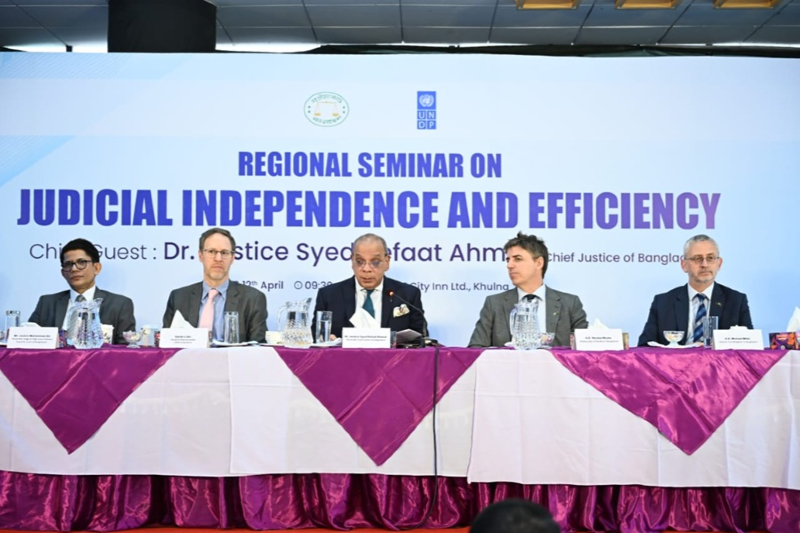Seminar Highlights Judicial Reform and Independence in Bangladesh

A regional seminar titled “Judicial Independence and Efficiency in Bangladesh” was held at the conference hall of Hotel City Inn in Khulna on Saturday (April 12, 2025) at 10:00 AM.
The event was jointly organised by the Supreme Court of Bangladesh and the United Nations Development Programme (UNDP), Bangladesh.
Chief Justice of Bangladesh, Dr. Syed Refaat Ahmed, graced the occasion as the Chief Guest.
The seminar was presided over by Justice Mohammad Ali of the High Court Division of the Supreme Court of Bangladesh.
UNDP Bangladesh’s Resident Representative Stefan Liller delivered the welcome remarks, while Michael Miller, Ambassador of the European Union to Bangladesh, and Nicolus Weeks, Ambassador of Sweden, attended as special guests and shared their perspectives.
The seminar focused on ensuring judicial independence and enhancing efficiency in justice delivery.
Participants included judges from various levels of the judiciary in Khulna, including the District and Sessions Judge Court, Metropolitan Sessions Judge Court, Chief Judicial Magistrate Court, Chief Metropolitan Magistrate Court, Labour Court, and other tribunals.
Judicial officers from Satkhira and Bagerhat districts, as well as representatives from the Khulna District Bar Association, public prosecutors, and other invited guests also took part.
The event followed an official directive issued on 25 March 2025 by the Training Wing of the Law and Justice Division under the Ministry of Law, Justice and Parliamentary Affairs, upon the advice of the Supreme Court.
In his address, Stefan Liller lauded the Chief Justice’s roadmap for judicial reform as a timely and visionary step toward institutional independence of the judiciary. He reaffirmed UNDP’s commitment to supporting Bangladesh in this transformative phase.
Chief Justice Dr. Syed Refaat Ahmed emphasized the judiciary’s pivotal role in ensuring justice and the rule of law.
He elaborated on the progress of his declared roadmap for judicial reform, acknowledging the proactive support of the interim government, particularly in enacting ordinances to facilitate the appointment of judges to higher courts in a timely manner.
He further noted that the Supreme Court and the interim government have been working in close coordination for successful implementation of the roadmap.
In particular, he highlighted the significant progress made by the Ministry of Law in drafting an ordinance to establish a separate secretariat for the judiciary, thanking the interim government for its dedicated cooperation.
The Chief Justice also pointed out that a substantial number of new judicial positions have recently been created with the support of the government to address the longstanding backlog of cases, which is expected to make a meaningful impact in the near future.
He stated that preliminary groundwork for the establishment of specialized commercial courts has already been completed. Moreover, two dedicated committees are working persistently to operationalize the Supreme Court Research Institute in Cox’s Bazar.
Summarizing the outcomes of regional seminars across the country, he remarked that valuable insights have emerged which will soon be incorporated into the strategic plan the Supreme Court is preparing to modernize Bangladesh’s justice sector.
He expressed hope that through the successful implementation of this strategic plan, the judiciary's post-July reform journey will reach fulfillment, ultimately restoring public confidence in the justice system.



